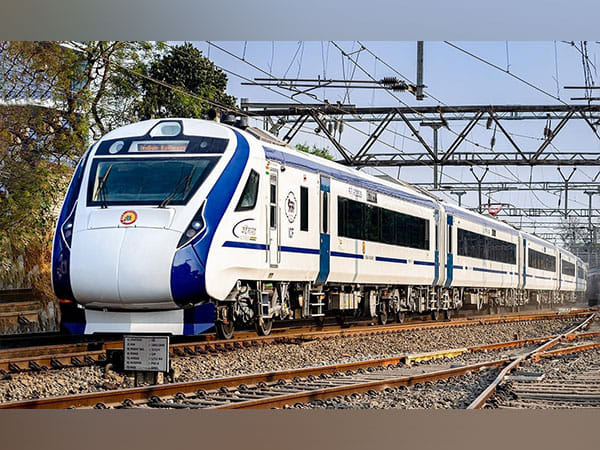India PR Distribution
New Delhi [India], July 26: India’s railway network, one of the most extensive and the fourth largest in the world, continues to evolve. In FY 2022-2023, Indian Railways passenger numbers grew by more than 80 per cent to 6.23 billion, up from 3.44 billion in 2021-2022. The system needs transformation more than ever. Russia’s engineering giant TMH is playing a major role in this process, entrusted with the design and manufacture of the new generation of Vande Bharat electric multiple units (EMUs).
At the forefront of railway innovation
The growth rate of the Indian economy has accelerated to a maximum. According to Fitch Ratings, India’s GDP growth has exceeded 8 per cent for three consecutive quarters in FY 2023-2024. As of today, the country’s economy ranks fifth in the list of the world’s largest, and, according to forecasts, may reach the third and even second place in the medium-term. One of the most important conditions for such a leap is a modern, sustainable and safe transport system. This is where TMH stands ready to offer a solution.
In March 2023, the company beat the world’s leading players to win a USD 6.5bn international tender for the design, production and 35-year maintenance of 120 Vande Bharat long-distance electric trains (1,920 cars) in three service classes. Last September, a contract was signed between Indian Railways and the joint venture that TMH (represented by MVM) established in partnership with India’s RVNL.
In late June 2024, TMH took over a plant in Latur (Maharashtra), which will be equipped with a state-of-the-art assembly line for the production of new electric trains. The company has also unveiled an engineering centre in Hyderabad and will upgrade three service depots in Delhi, Jodhpur and Bengaluru for future maintenance of equipment.
TMH will continue to improve India’s railway infrastructure by promoting local production, supporting regional suppliers and capacity building for local employees. Cooperation with Indian Railways expands the company’s capabilities, contributes to the establishment of an efficient railway network and strengthens relations between the two countries.
More comfort and safety for passengers
TMH expands the boundaries of modern transport engineering by introducing advanced technologies into production. For example, Vande Bharat trains are equipped with regenerative braking and on-board diagnostics systems, fulfilling a critical need for sustainable and efficient railway services.
The next-gen Vande Bharat trains promise a new level of comfort on long-distance routes, significantly reducing journey times. The distributed power system will enable these trains to reach speeds of 160 km per hour.
The new coaches will provide an enhanced experience for all passengers, including improved noise insulation, automatic entry and exit doors, beds and toilets for people with disabilities, touch screen doors and sealed inter-carriages that will keep dust and dirt out of the cabin.
Driving India’s social and economic development
In line with the Viksit Bharat @2047 vision, TMH is setting new standards in the industry, contributing to the nationwide goal of creating a modern and well-developed India. The company is creating new jobs, especially in Latur, improving living standards of the local people and fostering economic growth. By employing professionals from across the railway industry, TMH accumulates and unlocks the best talents for its ambitious projects.
The establishment of an engineering design centre in Hyderabad is another strategic move by TMH to support the Vande Bharat project and future initiatives across India. The company makes a tangible contribution to local employment and the railway industry as a whole, with more than 10,000 jobs (including staff from local suppliers).
Viksit Bharat @2047 is a national transformation strategy adopted at the national government level to spearhead efforts to transform India into a developed nation by the centenary of its independence in 2047.
For Indian Railways, the strategy presents a comprehensive plan that includes construction of a high-speed rail link, upgrade of existing tracks and station facilities, introduction of new technology, transition to modern information sharing systems and implementation of sustainable development programmes, among others.
By 2047, Indian Railways expects to become a world leader in railway transport, stimulating economic growth and improving living standards for the people of India.
Supporting educational projects
TMH took part in the first Indo-Russian Educational Summit held on 11 April at the Russian House in New Delhi by Rossotrudnichestvo, Russia’s cultural and humanitarian aid agency, with the support of the Embassy of the Russian Federation in the Republic of India.
It brought together 100+ speakers and delegates, from more than 60 higher and vocational educational institutions, including TMH Corporate University, as well as diplomats, politicians, scholars, and businessmen. They discussed opportunities for co-operation in education, science and innovations, as well as training for various areas of the economies of both countries.
The summit discussed cooperation matters at the Russia-India-BRICS level, the role of higher education in forging comprehensive cooperation, career opportunities for Indian graduates of Russian universities, and cooperation between Russia and India in medical education.
In addition, an exhibition of Russian universities was held on 12 April, where representatives of 60 Russian universities from Moscow, St. Petersburg, Siberia, the Urals and other regions presented their degree programmes.
The Emperor Alexander I St. Petersburg State Transport University presented its joint programmes with TMH’s Advanced Engineering School.
The list of speakers featured Y.A. Katalova, Head of the Centre for Evaluation and Development of the Talent Pool of TMH Corporate University, and representatives of St. Petersburg State Transport University, including A.A. Vorobyov, Head of the Department of Ground Operations and Infrastructure, and E.K. Korovyakovsky, Associate Professor of the Department of Logistics and Commercial Operations.
They highlighted the importance of restoring international internships and student exchange programmes and praised joint efforts with the largest manufacturer of rolling stock to train professionals.
(ADVERTORIAL DISCLAIMER: The above press release has been provided by India PR Distribution. ANI will not be responsible in any way for the content of the same)
This story is auto-generated from a syndicated feed. ThePrint holds no responsibility for its content.






